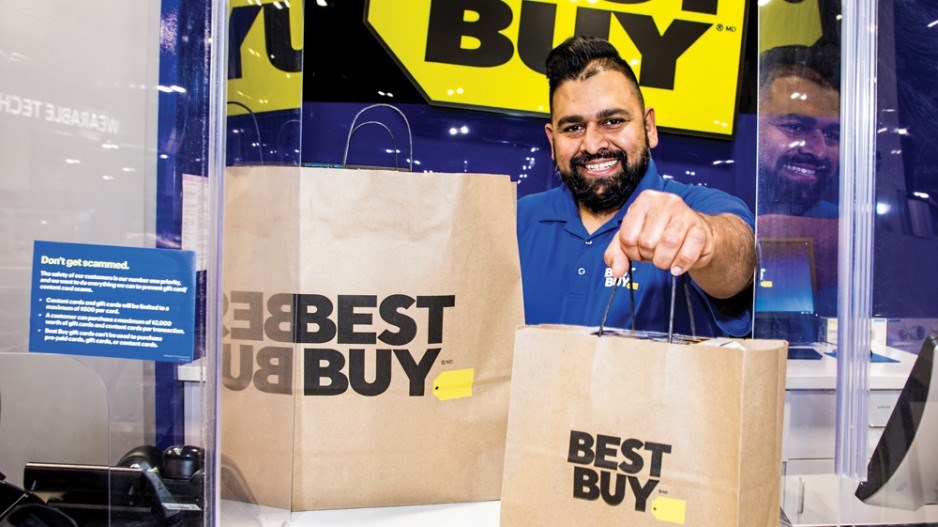Delays in provincial and federal laws mandating consistent standards on the use of plastic bags in stores have prompted a range of municipal bylaws across B.C.
The result is a bewildering range of standards for retailers.
Some merchants have phased out plastic bags; others are diverting them to stores in cities that still allow their use.
With fewer plastic checkout bags in circulation, retailers are also compiling data on whether customers are taking more produce bags home or buying more plastic garbage bags to use for household trash.
B.C. Environment Minister George Heyman told BIV that he plans to start soliciting feedback this spring on a provincewide ban on plastic checkout bags and other plastic items.
“Once we have the input, we expect to be introducing the changes in 2023,” he said.
The federal government is separately seeking input until March 5 on how it should draft a new law on plastic checkout bags and other plastic products.
Heyman said that he expects Ottawa to draft a broad framework that encourages provinces to make the regulations.
“If the federal government is not ready to move when we are, then we’ll proceed,” Heyman said.
Vancouver, Surrey, Victoria and several other B.C. cities have already banned retailers from providing customers with plastic checkout bags. In most cases, the cities require retailers to charge a minimum fee for each paper bag they provide.
Regulations differ, and many cities still allow retailers to provide plastic bags. The regulatory hodgepodge is expected to continue in the months ahead.
Bans on plastic checkout bags are set to go into effect in:
•Richmond on March 27, with no minimum fee when retailers provide paper bags;
•Chilliwack on April 1, with merchants required to charge at least $0.15 per paper bag;
•Port Moody on April 22, with merchants required to charge at least $0.25 per paper bag; and
•Delta on June 6, with merchants required to charge at least $0.25 per paper bag.
Bans in Sooke and Revelstoke are set for later this year.
“Consistency is always easier – both from a consumer perspective, as well as a retailer perspective,” Best Buy Canada’s director of retail and Geek Squad services Phil Thampy told BIV.
“It’s easier to manage expectations. If I live in Coquitlam and they have one rule, and then I go to Port Coquitlam and they have a different rule, it gets a bit confusing for the customer.”
The B.C. government last summer tweaked regulations to allow municipalities to pass these bylaws. Victoria passed legislation in October to allow it to enact the provincial law that Heyman intends to institute next year.
He said that a provincial law did not come before cities started to enact local bylaws because the same ministerial bureaucrats that would be drafting the law have been busy with other initiatives, such as drafting a law to require manufacturers, distributors and other businesses to be responsible for the life cycle of the products they sell, as well as a law to keep drinking water free of pollutants.
“I’m not attempting to lay the blame for our timetable on the pandemic,” he said.
The Retail Council of Canada (RCC) has wanted the province to draft a provincewide standard for years.
RCC director of government relations Greg Wilson told BIV that multiple municipal laws create unexpected complexity.
“The Vancouver and Victoria bylaws are very interesting, because you actually need different paper bags if you’re operating a store in Vancouver and a store in Victoria.”
Wilson added that the two cities’ bylaws stipulate that different sets of words must be printed on paper checkout bags, even though the bag’s material composition can be the same.
So far, he has not heard of any penalties for not having the legally required wording on the bags.
“What are they going to do?” he asked. “Fine you for using words that are slightly different?”
To get ahead of whatever federal or provincial regulations eventually arise, Thampy said that his Burnaby-based company stopped providing plastic checkout bags to customers at all of its Canadian stores in September, and it charges a flat $0.30 fee per paper bag in all of its stores.
Paper bags cost significantly more than plastic, so Thampy said the company is not netting any profit from the bag charges. He added that if any extra money is generated it will be donated to the Boys & Girls Clubs of Canada.
Save-On-Foods managing director of communications Julie Dickson-Olmstead told BIV that her company was cost-neutral when it provided customers with plastic bags, but “we’re going to be facing a point in time very soon when the cost of every [paper] bag is going to exceed what we charge.”
Her company continues to provide plastic bags in stores in cities that still allow the practice.
Save-On-Foods has not yet noticed that customers are taking more of the free plastic produce bags to meet their plastic-bag needs, she said.
Dickson-Olmstead added the company has also not yet seen a spike in sales for packaged plastic bags in areas where the plastic checkout bags are banned. •




